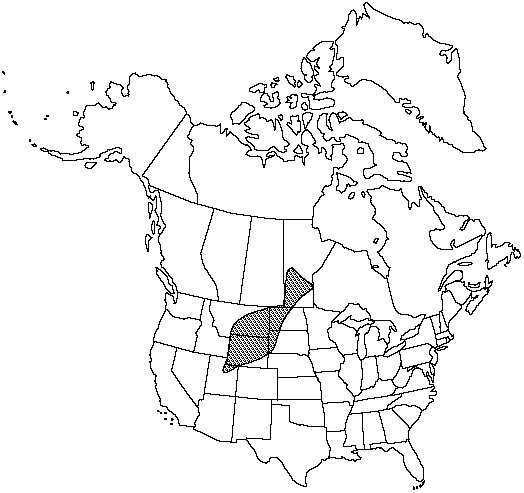Difference between revisions of "Pellaea glabella subsp. occidentalis"
Contr. Univ. Michigan Herb. 19: 39. 1993.
FNA>Volume Importer |
imported>Volume Importer |
||
| (7 intermediate revisions by 2 users not shown) | |||
| Line 7: | Line 7: | ||
|year=1993 | |year=1993 | ||
}} | }} | ||
| − | |basionyms={{Treatment/ID/ | + | |special_status={{Treatment/ID/Special_status |
| + | |code=E | ||
| + | |label=Endemic | ||
| + | }} | ||
| + | |basionyms={{Treatment/ID/Basionym | ||
|name=Pellaea atropurpurea var. occidentalis | |name=Pellaea atropurpurea var. occidentalis | ||
|authority=E. E. Nelson | |authority=E. E. Nelson | ||
| + | |rank=variety | ||
| + | |publication_title=Fern Bull. | ||
| + | |publication_place=7: 30. 1899 | ||
}} | }} | ||
|synonyms={{Treatment/ID/Synonym | |synonyms={{Treatment/ID/Synonym | ||
|name=Pellaea glabella var. nana | |name=Pellaea glabella var. nana | ||
|authority=(Richardson) Cody | |authority=(Richardson) Cody | ||
| − | }}{{Treatment/ID/Synonym | + | |rank=variety |
| + | }} {{Treatment/ID/Synonym | ||
|name=Pellaea glabella var. occidentalis | |name=Pellaea glabella var. occidentalis | ||
|authority=(E. E. Nelson) Butters | |authority=(E. E. Nelson) Butters | ||
| − | }}{{Treatment/ID/Synonym | + | |rank=variety |
| + | }} {{Treatment/ID/Synonym | ||
|name=Pellaea occidentalis | |name=Pellaea occidentalis | ||
| − | |authority= | + | |authority= |
| − | }}{{Treatment/ID/Synonym | + | |rank=species |
| + | }} {{Treatment/ID/Synonym | ||
|name=Pellaea pumila | |name=Pellaea pumila | ||
| − | |authority= | + | |authority= |
| + | |rank=species | ||
}} | }} | ||
|hierarchy=Pteridaceae;Pellaea;Pellaea glabella;Pellaea glabella subsp. occidentalis | |hierarchy=Pteridaceae;Pellaea;Pellaea glabella;Pellaea glabella subsp. occidentalis | ||
| Line 31: | Line 42: | ||
}}<!-- | }}<!-- | ||
| − | --><span class="statement" id="st- | + | --><span class="statement" id="st-undefined" data-properties=""><b>Ultimate </b>segments glabrous; sporangia containing 64 spores; spores averaging 38–52 µm diam. <b>2n</b> = 58.</span><!-- |
-->{{Treatment/Body | -->{{Treatment/Body | ||
| + | |phenology=Sporulating summer–fall. | ||
|habitat=Calcareous cliffs and ledges, usually on limestone | |habitat=Calcareous cliffs and ledges, usually on limestone | ||
|elevation=500–2800 m | |elevation=500–2800 m | ||
|distribution=Man.;Sask.;Mont.;N.Dak.;S.Dak.;Utah;Wyo. | |distribution=Man.;Sask.;Mont.;N.Dak.;S.Dak.;Utah;Wyo. | ||
| − | |discussion=<p>Most recent treatments refer to this taxon as Pellaea glabella var. occidentalis. It appears to be synonymous, however, with P. glabella var. nana, which was proposed 76 years earlier and has priority if the taxon is treated at varietal rank. This diploid (treated here as a subspecies) often shows prominent articulation lines near the base of the petiole, and plants with less divided leaves are occasionally misidentified as P. breweri. At least some of the sporangia of subsp. occidentalis are long-stalked, however, whereas those of P. breweri are sessile or subsessile.</p> | + | |discussion=<p>Most recent treatments refer to this taxon as <i>Pellaea glabella</i> <i></i>var.<i> occidentalis</i>. It appears to be synonymous, however, with <i>P. glabella</i> <i></i>var.<i> nana</i>, which was proposed 76 years earlier and has priority if the taxon is treated at varietal rank. This diploid (treated here as a subspecies) often shows prominent articulation lines near the base of the petiole, and plants with less divided leaves are occasionally misidentified as <i>P. breweri</i>. At least some of the sporangia of <i></i>subsp.<i> occidentalis</i> are long-stalked, however, whereas those of <i>P. breweri</i> are sessile or subsessile.</p> |
|tables= | |tables= | ||
|references= | |references= | ||
| Line 46: | Line 58: | ||
-->{{#Taxon: | -->{{#Taxon: | ||
name=Pellaea glabella subsp. occidentalis | name=Pellaea glabella subsp. occidentalis | ||
| − | |||
|authority=(E. E. Nelson) Windham | |authority=(E. E. Nelson) Windham | ||
|rank=subspecies | |rank=subspecies | ||
| Line 53: | Line 64: | ||
|basionyms=Pellaea atropurpurea var. occidentalis | |basionyms=Pellaea atropurpurea var. occidentalis | ||
|family=Pteridaceae | |family=Pteridaceae | ||
| + | |phenology=Sporulating summer–fall. | ||
|habitat=Calcareous cliffs and ledges, usually on limestone | |habitat=Calcareous cliffs and ledges, usually on limestone | ||
|elevation=500–2800 m | |elevation=500–2800 m | ||
| Line 59: | Line 71: | ||
|publication title=Contr. Univ. Michigan Herb. | |publication title=Contr. Univ. Michigan Herb. | ||
|publication year=1993 | |publication year=1993 | ||
| − | |special status= | + | |special status=Endemic |
| − | |source xml=https:// | + | |source xml=https://bitbucket.org/aafc-mbb/fna-data-curation/src/2e0870ddd59836b60bcf96646a41e87ea5a5943a/coarse_grained_fna_xml/V2/V2_625.xml |
|genus=Pellaea | |genus=Pellaea | ||
|species=Pellaea glabella | |species=Pellaea glabella | ||
|subspecies=Pellaea glabella subsp. occidentalis | |subspecies=Pellaea glabella subsp. occidentalis | ||
| − | |||
| − | |||
| − | |||
| − | |||
}}<!-- | }}<!-- | ||
-->[[Category:Treatment]][[Category:Pellaea glabella]] | -->[[Category:Treatment]][[Category:Pellaea glabella]] | ||
Latest revision as of 20:24, 5 November 2020
Ultimate segments glabrous; sporangia containing 64 spores; spores averaging 38–52 µm diam. 2n = 58.
Phenology: Sporulating summer–fall.
Habitat: Calcareous cliffs and ledges, usually on limestone
Elevation: 500–2800 m
Distribution

Man., Sask., Mont., N.Dak., S.Dak., Utah, Wyo.
Discussion
Most recent treatments refer to this taxon as Pellaea glabella var. occidentalis. It appears to be synonymous, however, with P. glabella var. nana, which was proposed 76 years earlier and has priority if the taxon is treated at varietal rank. This diploid (treated here as a subspecies) often shows prominent articulation lines near the base of the petiole, and plants with less divided leaves are occasionally misidentified as P. breweri. At least some of the sporangia of subsp. occidentalis are long-stalked, however, whereas those of P. breweri are sessile or subsessile.
Selected References
None.